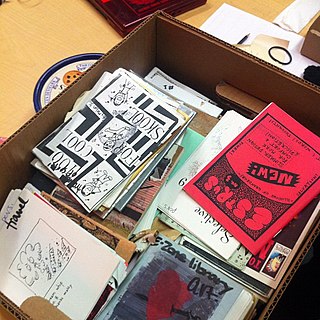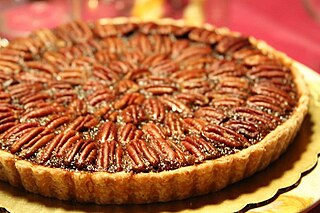
Dessert is a course that concludes a meal. The course consists of sweet foods, such as cake, and possibly a beverage such as dessert wine and liqueur. Some cultures sweeten foods that are more commonly savory to create desserts. In some parts of the world there is no tradition of a dessert course to conclude a meal.

New England cuisine is an American cuisine which originated in the New England region of the United States, and traces its roots to traditional English cuisine and Native American cuisine of the Abenaki, Narragansett, Niantic, Wabanaki, Wampanoag, and other native peoples. It also includes influences from Irish, French, Italian, and Portuguese cuisine, among others. It is characterized by extensive use of potatoes, beans, dairy products and seafood, resulting from its historical reliance on its seaports and fishing industry. Corn, the major crop historically grown by Native American tribes in New England, continues to be grown in all New England states, primarily as sweet corn although flint corn is grown as well. It is traditionally used in hasty puddings, cornbreads and corn chowders.

A zine is a small-circulation self-published work of original or appropriated texts and images, usually reproduced via a copy machine. Zines are the product of either a single person or of a very small group, and are popularly photocopied into physical prints for circulation. A fanzine is a non-professional and non-official publication produced by enthusiasts of a particular cultural phenomenon for the pleasure of others who share their interest. The term was coined in an October 1940 science fiction fanzine by Russ Chauvenet and popularized within science fiction fandom, entering the Oxford English Dictionary in 1949.

Meringue is a type of dessert or candy, of French origin, traditionally made from whipped egg whites and sugar, and occasionally an acidic ingredient such as lemon, vinegar, or cream of tartar. A binding agent such as salt, flour or gelatin may also be added to the eggs. The key to the formation of a good meringue is the formation of stiff peaks by denaturing the protein ovalbumin via mechanical shear.

Belgian cuisine is widely varied among regions, while also reflecting the cuisines of neighbouring France, Germany and the Netherlands. It is sometimes said that Belgian food is served in the quantity of German cuisine but with the quality of French food. Outside the country, Belgium is best known for its chocolate, waffles, fries and beer.
Queercore is a cultural/social movement that began in the mid-1980s as an offshoot of the punk subculture and a music genre that comes from punk rock. It is distinguished by its discontent with society in general, and specifically society's disapproval of the LGBT community. Queercore expresses itself in a DIY style through magazines, music, writing and film.

Hardline is a deep ecology subculture that has its roots in the vegan straight edge hardcore punk scene. It is commonly seen as a more extreme version of straight edge. From its outset, Hardline adherents put out statements and literature pushing a biocentric view of the world, which advocated for militant veganism, animal rights, anti-abortion, anti-homosexuality, and a much more militant version of the straight edge philosophy, which advocates for a no alcohol, no drugs, no tobacco lifestyle. The Hardline worldview has been described variously as ecoauthoritarian and ecofascist in nature. Nonetheless, Hardline co-founder Sean Muttaqi adamantly rejected racism and fascism.
Jones Soda Co. is a Canadian-American beverage company based in Seattle, Washington, United States. It bottles and distributes soft drinks, non-carbonated beverages, energy drinks, and candy.
Butterfinger is a candy bar manufactured by the Ferrara Candy Company, a subsidiary of Ferrero. It consists of a layered crisp peanut butter core covered in a "chocolatey" coating. It was invented by Otto Schnering of the Curtiss Candy Company in 1923. The name was chosen by a popularity contest.
Last Hours is an anti-authoritarian publishing collective. From 2003 to 2008 it produced a fanzine, initially called Rancid News until issue 9, changing its name to Last Hours from issue 10 till the final issue, 17, in May 2008. All 17 issues were edited by Edd Baldry before he stood down as editor. Since 2008 Last Hours has become a publishing collective, launching a website, and releasing two books in the autumn of 2009, Excessive Force and Diary of a miscreant.

Pecan pie is a pie of pecan nuts mixed with a filling of eggs, butter and sugar. Variations may include white or brown sugar, cane syrup, sugar syrup, molasses, maple syrup, or honey. It is commonly served at holiday meals in the United States and is considered a specialty of Southern U.S. origin. Most pecan pie recipes include salt and vanilla as flavorings. Pecan pie may be served with whipped cream, vanilla ice cream or hard sauce.

Cinnamon sugar is a mixture of ground cinnamon and granulated sugar used as a spice to flavor foods such as Belgian waffles, Snickerdoodle cookies, tortillas, coffee cake, French toast, and churros. It is also used to flavor apples, cereals, and other fruits. As McCormick describes cinnamon sugar, "it’s the comforting scent of Sunday morning cinnamon toast and mid-summer’s peach cobbler...the aroma of the holidays, with cinnamon cookies and spice cake."

Razorcake is a 501(c)(3) non-profit organization that publishes the Razorcake fanzine, a DIY punk rock fanzine published bi-monthly out of Los Angeles, California. It was co-founded by Todd Taylor and Sean Carswell in 2001.
Norman Love is an American pastry chef located in Fort Myers, Florida.
Animal rights are closely associated with two ideologies of the punk subculture: anarcho-punk and straight edge. This association dates back to the 1980s and has been expressed in areas that include song lyrics, benefit concerts for animal rights organisations, and militant actions of activists influenced by punk music. Among the latter, Rod Coronado, Peter Daniel Young and members of SHAC are notable. This issue spread into various punk rock and hardcore subgenres, e.g. crust punk, metalcore and grindcore, eventually becoming a distinctive feature of punk culture.

Ox-Fanzine is a monthly punk zine from Solingen, Germany, founded in 1988. It is edited by Joachim Hiller and has had many contributors. Besides its focus on punk subculture, it also covers similar genres, reviews of comics, books and films, and has included serial novels by authors such as Klaus N. Frick.
Pie in American cuisine has roots in English cuisine and has evolved over centuries to adapt to American cultural tastes and ingredients. The creation of flaky pie crust shortened with lard is credited to American innovation.









